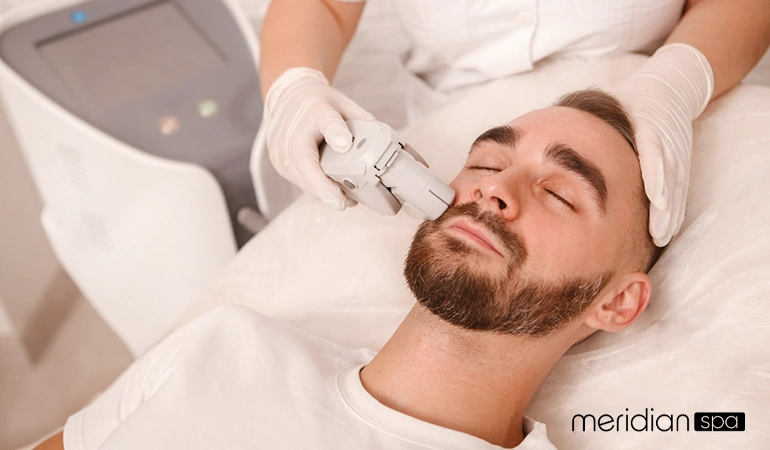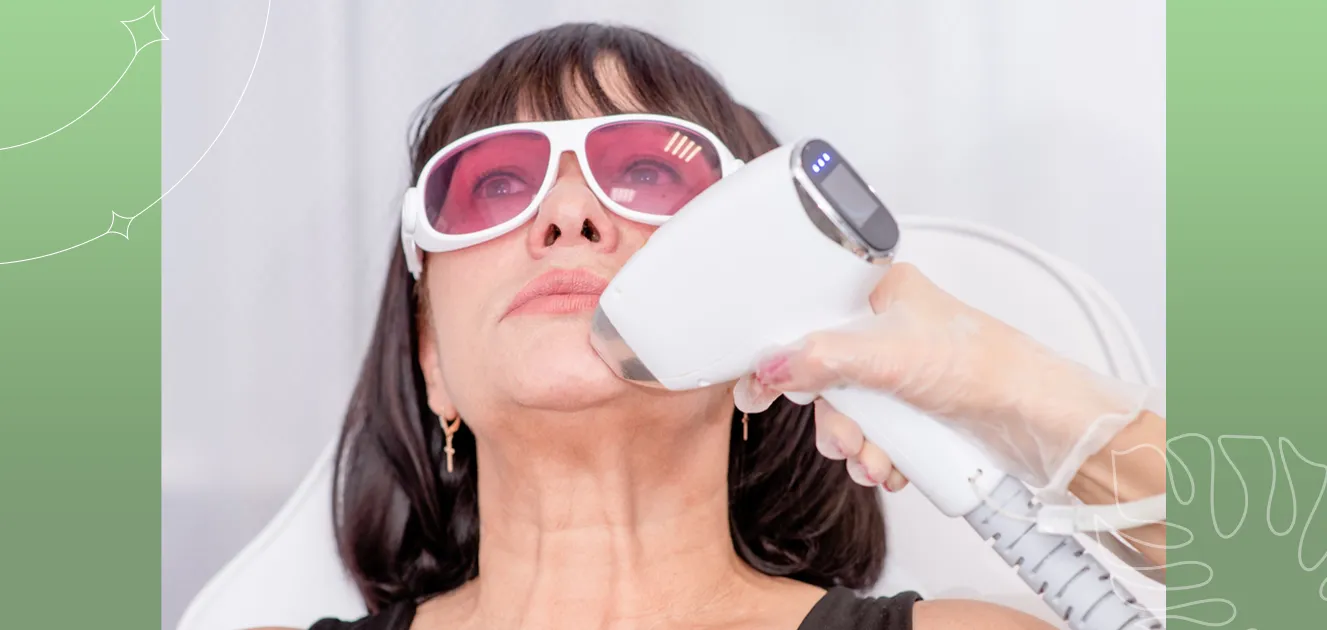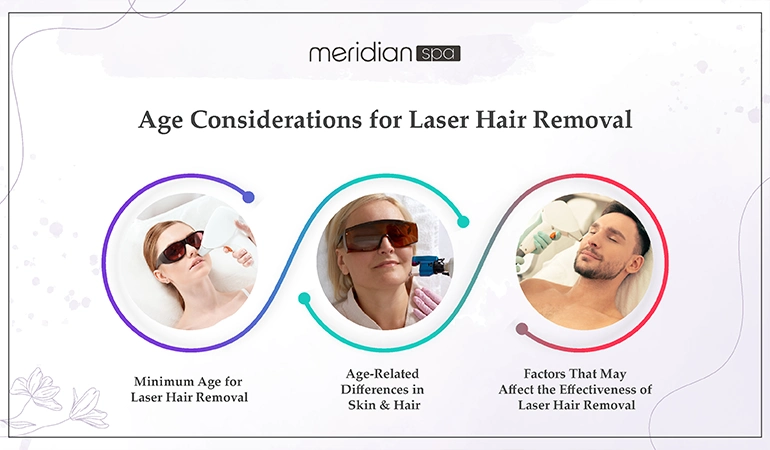Regardless of age, whether you are 16 or 116, everybody has body hair. However, following the genetic variations, everyone might have different types of hair. Everyone wants to look fresh and confident, so they do not want undesirable hair on their body.
Laser hair removal is a known cosmetic practice that targets and abolishes hair follicles, plummeting unwanted hair. It is a relatively non-invasive and long lasting hair removal method compared to other options, such as waxing or shaving.
However, the question “how old for laser hair removal?” has been debated for a long time. In this article, we have tried to cover different aspects of hair removal techniques following this question.
If you also want to understand treatment safety and skin suitability, read our detailed guide on is laser hair removal safe for your face.
Age Considerations for Laser Hair Removal

1. Minimum Age for Laser Hair Removal
Most laser hair removal providers have a minimum age requirement, typically 16 or 21. This is because the safety and effectiveness of laser hair removal may be affected by factors such as hormonal changes and skin sensitivity, which can differ between younger and older individuals.
Safety and results can vary depending on skin condition and treatment area. You can learn more about laser hair removal suitability and safety factors before deciding.
However, it has been seen that younger teens start looking for ways to get rid of unwanted in their school years. An article in The Cut has revealed that every student in a downtown Manhattan school gets laser hair removal treatment.
It means that even younger people can get this treatment, but there might be some issues, such as burns and infections. Overall, laser hair removal treatment is safe for people of all ages. So, there is no specific answer to at what age you can get laser hair removal UK.
2. Age-Related Differences in Skin and Hair
As we age, our skin and hair can undergo changes that may affect the outcomes of laser hair removal. For example, older skin may be more sensitive to laser treatments and may take longer to heal, while older hair may be finer and lighter in color, which may make it more difficult to target with lasers.
3. Factors That May Affect the Effectiveness of Laser Hair Removal

There are plentiful elements that may affect the usefulness of laser hair removal, regardless of age. These include:
- Hair color: Lasers are most effective at targeting dark, coarse hair. Blonde, red, and Gray hair may be more difficult to treat.
- Skin color: Laser hair removal may not be as effective on darker skin tones, as the pigment may absorb the laser energy in the skin rather than the hair follicle.
- Hair growth cycle: Laser hair removal works by targeting aggressively growing hair follicles. If a significant proportion of the hair in an area is not in the active growth phase, the treatment may not be as effective.
Risks and Precautions for Laser Hair Removal

While laser hair removal is generally considered safe when executed by a qualified professional, there are some possible risks and side effects to be aware of. These may include:
- Skin irritation: Laser hair removal can cause redness, itching, or swelling in the treated area. These symptoms are generally impermanent and resolve within a few days.
- Pigment changes: Laser hair removal can result in the lightening or darkening of the skin in the treated area. These changes can be momentary or enduring.
- Infection: Laser hair removal poses a small risk of infection, particularly if the skin is not properly cared for after treatment.
To minimize the risk of these side effects, following all instructions provided by your medical professional before and after treatment is important. This may include avoiding certain activities (such as sun exposure or sweating) and using recommended skincare products.
Alternatives to Laser Hair Removal

If you are not a good applicant for laser hair removal or prefer not to use lasers, there are several other hair removal options to consider. These include:
- Waxing: This method involves the use of hot wax to remove hair from the root. It might be throbbing and may cause irritation and redness.
- Shaving: Shaving comprises using a razor to cut the hair off at the skin’s exterior. It might be a swift and easy method, but the hair will grow back rapidly and may become stiffer over time.
- Depilatory creams: These creams comprise substances that liquify the hair at the skin’s surface. They may cause irritation and are not suitable for all skin types.
Conclusion
In conclusion, age is one factor that may affect the safety and effectiveness of laser hair removal. It is important to consult a qualified medical professional to determine the best hair removal method for your individual needs and circumstances.
If you are considering treatment, you can explore professional laser hair removal in Greenwich London to see how the procedure works and who it is suitable for.
Frequently Asked Questions
1. How long does laser hair removal take?
The duration of a laser hair removal treatment always depends on the size of the area of the treatment. A trivial area, such as the upper lip, can take just some minutes. On the other hand, a larger area, such as the legs and bikini area, may take up to an hour.
2. How many laser hair deletion sessions will I need?
Most people need manifold laser hair removal sessions to attain their anticipated outcomes. The number of sessions will hinge on several factors, including the thickness and density of the hair, the color of the hair, and the size of the treatment area.
3. Is laser hair removal permanent?
Laser hair removal is not a lasting solution for hair removal, but it can significantly reduce the volume of hair in the treated area. Most people will experience a permanent reduction in hair growth of at least 50%, and some may experience complete hair loss.
4. Can laser hair removal be used on all skin types?
Laser hair removal techniques are useable on most skin types. Still, it may not be suitable for individuals with certain skin conditions, such as active acne or a history of skin cancer. Your medical professional will be able to advise you on the suitability of laser hair removal for your skin type.
5. How I should prepare for laser hair removal?
There are several things you should do to prepare for laser hair removal, including:
- Avoiding sun exposure and tanning for at least four weeks before treatment
- Shaving the area to be treated one or two days before the appointment
- Avoiding certain medicines that can upsurge sensitivity to light
- Wearing loose, comfortable clothing to the appointment
- Following any other instructions provided by your medical professional.

